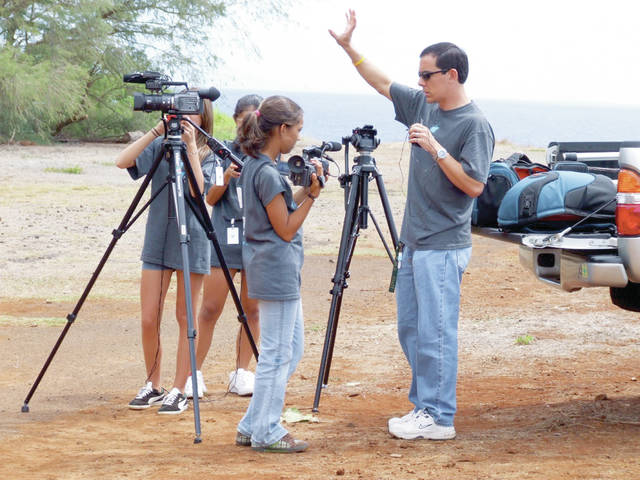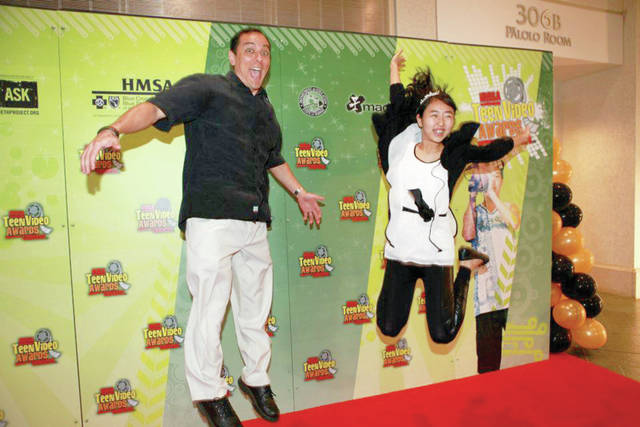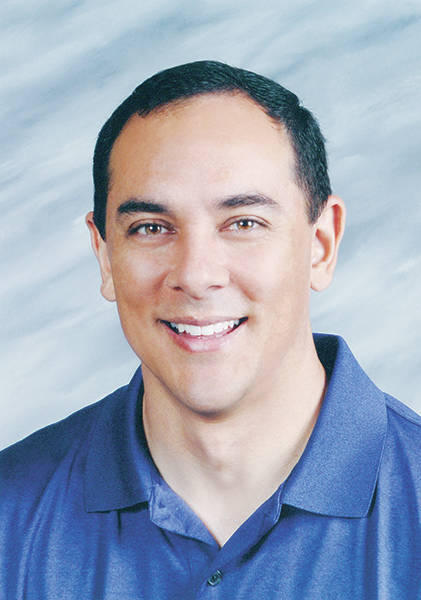Talk Story with Kevin Matsunaga

Photo courtesy of Kevin Matsunaga
Kevin Matsunaga instructs former students Tien Soderstrom, Jannin Hashizume and Cascade Mayer while documenting and filming the release of shearwaters by Island School.

Photo courtesy of Hawaii Medical Service Association
Teacher Kevin Matsunaga, left, celebrates with former media production student Lisa Yamasato, who was a finalist during the HMSA Team Video Awards program.

Photo courtesy of Herbie’s Photography
Kevin Matsunaga has been media production teacher at Chiefess Kamakahelei Middle School since the school opened in 2000.
Kevin Matsunaga, media productions teacher at Chiefess Kamakahelei Middle School, inspires students to follow their dreams.
Kevin Matsunaga, media productions teacher at Chiefess Kamakahelei Middle School, inspires students to follow their dreams.
In addition to instructing beginning media and yearbook courses, his advanced media productions class participates in the nationally broadcast Student Television Network and are members of the nation’s first statewide student news network, PBS Hawaii’s Hiki No.
His students produce daily live morning announcement shows on the school’s closed-circuit television system and create various video projects for the school and community through his guidance.
How did you get started as an educator and teacher?
I was always the cousin that would take care of the younger cousins anytime there was a family function, playing games with them. My dad was an educator at Kapaa High School, then became librarian at Hanalei and Kilauea schools. He was the first one to suggest it. My junior year at University of Hawaii Manoa, I got into the College of Education and started working with kids more. I worked at the A+ Program at Hokulani Elementary School in Manao, got some experience and met my wife. She was my boss, and I was her aide. She was also studying to be a teacher the same time. I got my degree and then professional diploma in Elementary Education with a minor in Language Arts.
I taught on Oahu first for seven years at Lehua Elementary School, became the technology coordinator and ran the computer lab my last two years. In ‘98 my mom passed away from cancer, and my dad had some heart issues. In 2000, we decided to move back home. My wife and I had our first daughter, Melanie, who was a year old. It was timed with Chiefess Kamakahelei opening in 2000. When I got the job as technology coordinator, the principal wanted a new tech school with TV show announcements.
How was teaching on Kauai different?
On Oahu, I had created a tech club after school. We developed videos and created our own monthly show but never anything that was live every day, so I had to learn. I met teacher Candy Suiso, who started a program at Wainae High School called Searider Productions. At a technology conference, I was sharing about this program I had my students involved in. They placed third internationally in a website-building contest in ‘98, called Think Quest. Two students created a website on surfing, like a choose your own adventure. Based on your choices it took you to different pages, and it placed internationally.
When I had to do the morning announcements, Candy was the first one so open and giving to sharing info. I met with her and other people, moved back to Kauai, opened the school, started my class, taught my first elective course in 2000, and we expanded every year. I started with 16 kids. We had four computers, and everybody had to share. We started entering our work in contests and winning.
The Hawaii Student Film Festival was the first contest we entered. We submitted a couple videos and some won. Then Olelo Television on Oahu started the Youth Xchange, an annual competition. We started submitting work and won. When we found out about STN, one of my students created a PSA on reading. At that time they didn’t have middle school categories, so we entered the high school category and placed fourth. Here you are a middle school student placing in a high school competition. We started sending stuff after that.
Tell us more about the Student Television Network (STN) competition.
Student Television Network created the first national convention in California, and we took the first group of kids in 2004. There were about 500 kids total. It was cool to see these kids and meeting teachers doing what we were doing in digital media. From 2006, we’ve gone back every single year. This year we’re going to Nashville, Tennessee, in March. I was asked to be part of their board, so I’ve been a member for the last six years.
STN sponsors several contests throughout the year, they also run three days of non-stop on-site contests. Everyone gets the same topic at the same time, and you have about three hours of production and three hours to edit. When the timer hits zero, the basket is pulled, even if you’re running down the hall. In the real world, deadlines are deadlines. Sometimes it’s a painful lesson; it’s a good experience.
How did your students’ videos get aired on statewide television?
Five or six years ago, PBS Hawaii started the Hiki No program and wanted to create a weekly half-hour show on Hawaii news by students. They got us involved from the beginning, so we’ve been part of their steering committee to help the program evolve. We had one about a student in our class who created a video for a family friend who has special needs. This boy was getting teased and kids weren’t nice to him. His mom was a teacher in our school and was feeling really bad. We suggested that we do a creative video, so students can develop empathy for him. One of our students was a close family friend of that teacher, created this video for his classmates, and totally changed everything at the school for that boy. The mom couldn’t believe that kids were being friendly, and he wasn’t getting teased. Our students did a story on that video, and it aired on Hiki No. I’m also one of the trainers for their summer workshops. For the past several years, Hiki No will sponsor these workshops for teachers on all the islands. Myself and other teachers are part of this group, called the Hawaii Creative Media Team, and run workshops for PBS Hawaii. We travel to each island every summer and run like 4 of these workshops on every island.
Tell us about the new state licensing requirements for teachers.
With my degree from the University of Hawaii, I’m licensed to teach kindergarten through sixth grade. Chiefess is a middle school, so we teach sixth to eighth. I am technically not licensed to teach seventh and eighth graders because of my degree. In 2015, a federal law came out that said teachers need to be highly qualified in the area of content they’re teaching. It was targeted to core areas like social studies, science, math and language arts. Because we have a shortage of applicants available, sometimes we have no choice but to hire someone who may not have a teaching degree. A letter would go home to parents of those children who are in that class letting them know that this teacher is not licensed as part of the law. So we have to send home that letter that may give people the wrong impression. I’ve been teaching those courses since 2000, and our kids have been doing well. Anyone that knows me would doubt that I’m not qualified for it.
The state has given a couple of ways to get that designation, but it doesn’t really fit my situation. One option is to take a Praxis exam in their content area to get their teaching license. There are no exams right now for arts and communication, which digital media falls under. The only way I can get licensed for secondary would be to take a Praxis in subjects I don’t teach. Another option would be to go back to school, but I’m trying to pay for college for my kids. I don’t want to pay for college for me too. I wasn’t happy about the letter, I feel it gave parents the wrong impression if they weren’t familiar with my program or work.
What are some of the most gratifying things about working with the students?
I love to see change. You get to provide instruction and give students opportunities to learn things on their own and grow. There was a girl in my class as a sixth-grader who barely spoke. She was so shy and reserved. I had her for three years. She ended up being one of my strongest students. PBS did a documentary about our class when we went to the STN trip to Atlanta two years ago. They interviewed her, and she was so articulate, well-spoken and confident. When you see what you are doing is helping kids gain confidence and learn new skills to believe in themselves, that is the best part about teaching and why I keep doing it.
How is it working with your students’ parents?
We’ve been very lucky to have parents that believe in the program willing to give as much as their kids because they believe in them. I’ve been very lucky to have that opportunity to get to know parents. Some parents have become my best friends just from our interaction with the class. A lot of times now though, I definitely see there’s more of a challenge for parents to accept that their child did something wrong.
What are some of the accomplishments you are most proud of?
If students can succeed in whatever they are doing and we had some part, that to me is the best. They learn how to be a good team member, work well with other people, problem solve, communicate with each other, meet deadlines, be responsible and take responsibility for your work, good and bad. If those things have helped them in any way to achieve success, that’s all we need. Our goal has never been to pump out the next Spielberg, but exposing kids to media, showing them there are opportunities. It’s about working with these kids and developing them as teammates, people that will be there for their friends, play fair, be good role models to others. Those are all the things that are way more important than if someone becomes a director.
How are you involved with the Kauai Technology Center?
The Kauai Economic Development Board were really big on helping schools with different projects and things. We were very lucky to get involved with them when they were doing these Aloha Ike fundraisers and grant opportunities for purchasing equipment. I wrote a grant to get equipment to start televising high school sports, because I wanted kids who leave my program have more opportunities at high school. I talked to KEDB about purchasing a streaming package mobile system we can take to games, involve the high schools, their kids, their programs, our former kids, and allow them to be able to learn about filming a live shoot instead of recording and editing it down later. We purchased equipment and were able to have kids at the three high schools share the equipment.
KEDB was really supportive helping teachers with these Aloha Ike grants. After working with them, I thought it would be awesome to have a space where it doesn’t matter what school you come from. The idea came up to have a technology center, where any kid from any school, any community on the island, could show up and have a place with professionals to help you with different projects. We could also use the center to help adults on the island if they wanted to get into their own productions. There were lots of different ideas; my part was education. What if we had a studio where Hollywood could rent out when filming here to do inside set work? We could have a full-blown studio they could use, we could have a high-speed connection to upload their stuff to people back on the Mainland. We could use it for meetings, small concerts and recording studio used for musicians. The project is still there, but now the challenge is to try to keep that moving.
What are your future plans as a teacher and father of three?
My youngest is going to Kauai High School next year, so this will be the first time in eight years where I won’t have a child at my school who is part of my program. It’s been really nice having one of my kids with me every day, going to school with me and coming home. Since I’m the only teacher of that course, they’ve been allowed to be in my class. It’s been really special to have them that close with me.
I still want to continue doing media, and Kauai is my home. We’re really happy being part of the community, involved with the things our media programs have allowed us to do. My class is managing Kauai Grown’s social media accounts and taking videos, helping them promote their program. We’re working with the Friends of King Kaumuali’i, creating videos to help in their fundraising efforts. We are always trying to get our stories on Hiki No, because viewers around the state see it. We’ve been very blessed to have a lot of support from community, lots of organizations who see work we are doing and believe in our kids.
When you go on these trips you represent your school, the program, our state, and people that have been in our program in the past, because the work they did opened doors for you. You need to continue, so doors will stay open for people after you. We try to ingrain that, because we come from a small island people don’t know too much about. I want them to see these kids know what they’re doing in media. We try never to be cocky or boast; it’s not the pono way to do things. Just stay humble, be thankful for what you have, appreciate the things you’re given, and work hard so that can continue for others.
What are some of the challenges that youth face today?
The problems some of these kids have would crush an adult sometimes. At such a young age they have a lot of issues to deal with. We did a story on suicide coming out on Hiki No. That was such a sobering thing for our kids to learn how suicide is such a big problem. Sometimes we forget that all kids need somebody to talk to. If you are able to provide any kind of guidance to any kid at any time, you should try to do that and listen. It will open your eyes to see what these kids are going through. If you can help a kid, that’s one of the greatest rewards you can have. Anyone that’s out there that wants to become a teacher, you’ll never be rich. But I don’t know many other professions out there as satisfying as when you can help a kid.

